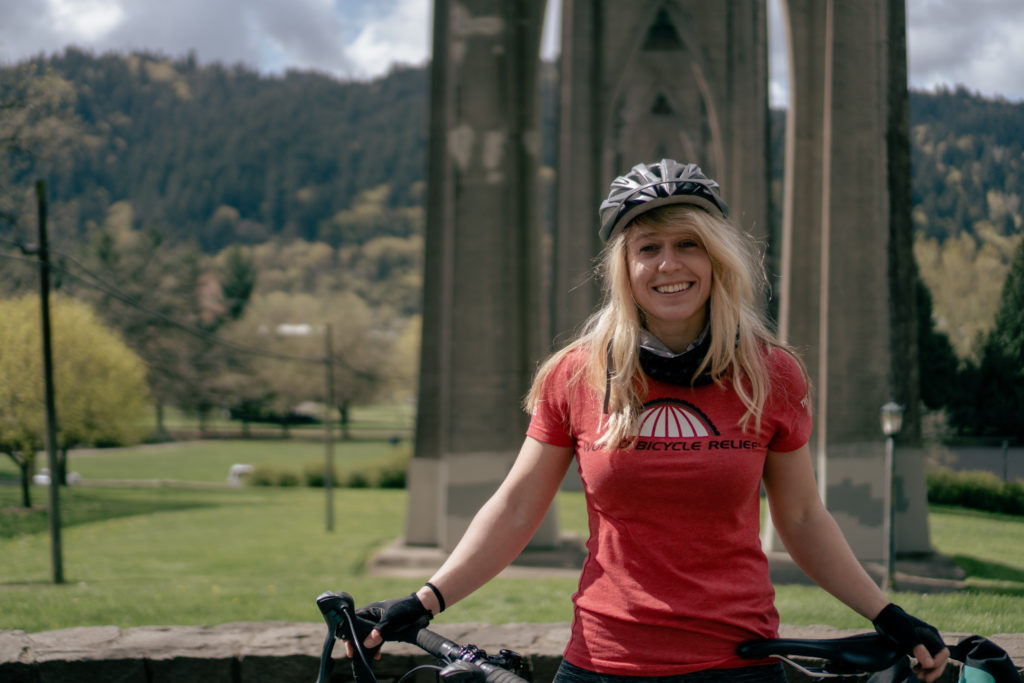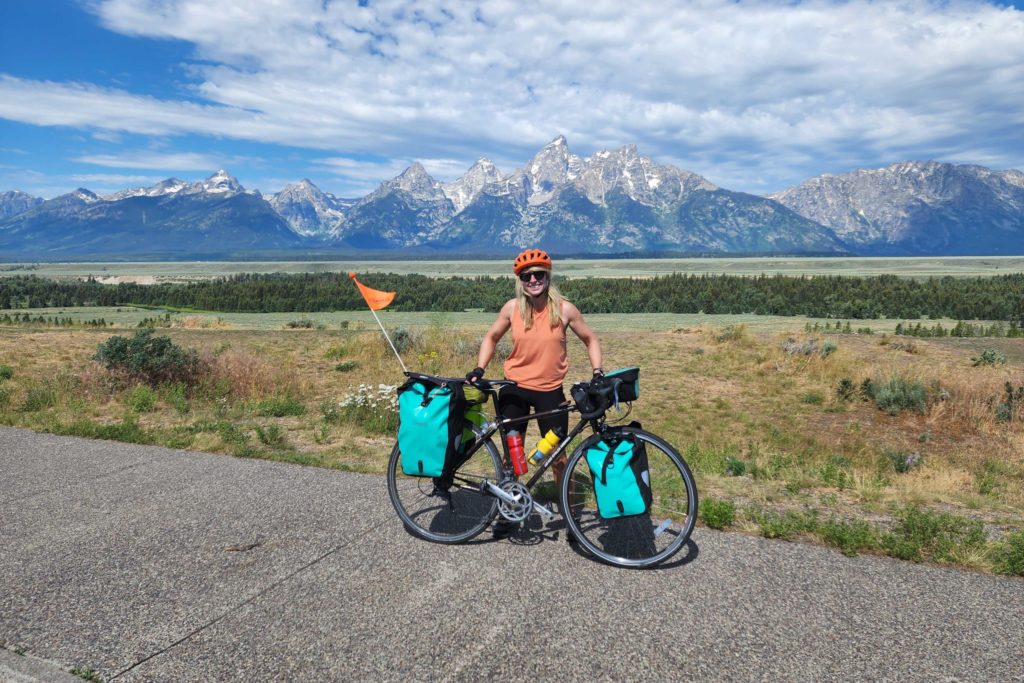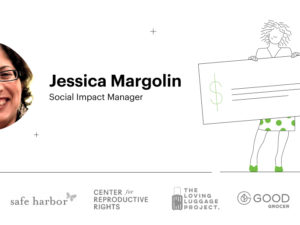
Articulate offers service sabbaticals to support our employees doing work to advance human rights, civil rights, and environmental health. Over the next few months, we’ll chat with each of Articulate’s 2022 Service Sabbatical recipients. You’ll get to know more about how they’re making an impact, both at work and out in the world.
Kat Giroux is many things: writer, rock climber, mentor, cyclist, all-around adventurer. But this summer, she put one of those passions to the ultimate test. As one of three recipients of Articulate’s 2022 Service Sabbatical awards, Kat biked the 4,218-mile TransAmerica Trail to raise money for World Bicycle Relief. The nonprofit organization delivers rugged bicycles to people in need around the globe.
We spoke with Kat recently to hear all about her incredible journey and why this cause matters to her.
Now that you’ve completed the journey, how did the experience match up with your expectations?
I honestly went into the trip having no idea what to expect, and I questioned whether my goals were realistic. I thought there was a fair chance I wouldn’t be able to cycle the entire distance or meet the full fundraising amount. So, I told myself I would be satisfied if I raised at least $10,000 and made it 30 days on the bike.
Reality surpassed my expectations in every way. I was astounded and awed by the support of friends, family, and coworkers who donated a whopping $18,421—or just over 111 bikes—putting us at 111% to goal. I used Instagram to post a daily journal from the road, and I was touched by how many people followed along and became personally invested in my journey.
What surprised you the most?
I was amazed by the adaptability of the human body and mind. I expected more injuries or fatigue—and I anticipated having a tougher time mentally. While I did experience a painful IT band injury the second day on the road, this quickly healed with anti-inflammatory medication and stretching. By the time I was two or three weeks in, I felt unstoppable. Camping in a different town every night, riding 75-mile days, and eating a diet of mostly gas station food felt weirdly normal. Overall, I’m shocked things went so smoothly.
What was it like out there on the road, day after day?
Don’t get me wrong—90% of the trip was definitely Type 2 fun (the kind that’s a bit miserable in the moment, but by the next morning, you’re inexplicably excited to do it all over again!). Out West, I had to climb for hours up the Cascades and Rocky Mountain ranges. Southern Wyoming was windy and barren. Colorado had no road shoulders, heavy traffic, and daily afternoon thunderstorms. I hit Kansas during the nationwide heat wave and battled 100+-degree weather with no shade, high humidity, few services, and headwinds. The Ozarks were impossibly steep. Savage dogs terrorized me across Missouri, Southern Illinois, and Kentucky. And for a particularly steep section near the Blue Ridge Mountains, the hill grade plus limitations of my bike gear range made it so difficult I had to break every 0.15 miles for 4 miles straight.
Yet I loved the simplicity, adventure, and challenge of life on the road. I experienced the generosity of strangers, the beauty of nature, the satisfaction of pushing my limits, and the humor in discomfort and things going ridiculously wrong. After the exhaustion of a challenging mountain pass came the joy of careening down the other side. Few people have the luxury of focusing all of their time and effort into a single mission. It was indescribably fulfilling—and an experience I’ll cherish for the rest of my life.
What was your training regimen like to get prepared for this?
It’s funny, because most cyclists advised me NOT to train at all, rationalizing that “you get conditioned on the road.” But I wanted to go into the trip knowing that I’d done everything within my power to avoid preventable injuries and set myself up for success. At the same time, I had to balance training with working full-time (and still trying to enjoy a life outside of cycling!).
As such, my training regimen involved cycling 10 miles, four times a week—and 20-40 miles one day a week. I added 40-lb sandbags to my panniers to mimic the weight of my gear. I also cross-trained by rock climbing at my local climbing gym 2-3 days a week, and I did targeted stretches recommended by my physical therapist.
What made you want to challenge yourself this way?
I was searching for new ways to step outside my comfort zone and deepen my sense of purpose. I thought Articulate’s Service Sabbatical program was a unique opportunity to make a positive impact and try something new.
When exploring ideas, I looked for the intersection between my interests, strengths, and potential impact. I love challenging physical feats and outdoor adventures, so that part really appealed to me. As a writer, I thought my writing skills would translate well to fundraising, and I could also leverage my community relationships toward that effort. Last but not least, World Bicycle Relief already has many talented and experienced field experts, so I felt I could have a greater impact through fundraising than volunteering.
Those of us who aren’t avid cyclists probably didn’t realize what kind of impact World Bicycle Relief has on communities and individuals around the world. What does that organization mean to you personally?
World Bicycle Relief mobilizes people through the power of bicycles, providing access to healthcare, education, and economic development opportunities. I chose this cause for two main reasons.
First, I love that World Bicycle Relief provides a simple and tangible solution. The outcome of donating to World Bicycle Relief is immediate and easy to grasp—$165 delivers one “Buffalo Bicycle” to a person in need. With so many complex issues in the world, I felt like this was one way I could realistically make a difference.
Second, as someone based in one of the most bike-friendly cities in the United States (Portland, OR)—I have a personal connection to biking. My bike is my main form of transportation around the city. I’m excited to support a nonprofit that uses something I’m passionate about in such an innovative and powerful way.
Tell us about the Buffalo Bicycle.
So, the Buffalo Bicycle isn’t your typical bike: World Bicycle Relief designed it specifically to fit the needs of the individuals and communities they serve. While most of the world’s bicycles are lightweight, complex, and made for recreation, the Buffalo Bicycle is engineered for heavy loads, long distances, and rugged terrain. The result is a stronger, simpler, and sustainable bicycle built with high-quality parts and materials.
In practice, that means girls have a shorter and safer commute to school. Bikes increase student attendance by 33%, lower dropout rates by 19%, and improve academic performance. Health care workers reach 88% more patients. And entrepreneurs gain access to distant markets while carrying up to five times more goods.
What do you hope will be the lasting impression that people take away from this?
I hope other Articulaters realize there are so many opportunities available to seize at Articulate—whether that means applying for a service sabbatical, joining an ERG, or just talking to your manager about development opportunities.
On a broader level, I hope my story shows that ordinary people can make a difference and pursue extraordinary feats. I personally didn’t have any experience fundraising or bikepacking for longer than a weekend, yet I still managed to pedal my way across America, rally my network, and raise over $18,000 for a cause that’s important to me. Success—like anything in life—is not guaranteed. But you don’t have to feel 100% ready or confident to keep advancing toward your greatest ambitions and dreams.


